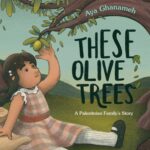These Olive Trees by Aya Ghanameh

Published by Penguin Random House on August 22, 2023
Keywords: Resistance, Power, Difficulty, Hope, Identity
Summary: The story of a young Palestinian girl named Oraib, who lives in a refugee camp in Nablus after her family is forcibly relocated from their home. She guides us through the experience of forced displacement and highlights the significance of olive trees in Palestinian culture. When attacks reach the refugee camp, danger comes right to their doorstep, forcing the families to leave again. Instead of losing hope, Oraib plants one of the olive tree seeds and plans to someday return to it, embodying a story of hope and resilience.
Lesson: Teaches the ability to recognize difficulties and overcome them, remaining hopeful for the future. Also discusses resilience, strength, and overall ability to continue life after hardship, while remaining connected to the past.
Censorship: This book has experienced soft censorship, which means that “books quietly disappear from shelves and reading lists without any official ban” (Yuksel, 1).
Highlights: Throughout the story, Oraib is portrayed as a strong character who perseveres, inspiring many children. Further, her family has a strong sense of stability in her life and remains close. I appreciated how the book also showcased her community’s ability to stay close-knit while living in a refugee camp, engaging in activities, and building kites.
Children’s Identity: These Olive Trees is a perfect book for not only children who have prior knowledge or awareness of the conflict, but is also a great introduction to those who have no background information due to its ability to convey its effects on ordinary Palestinian families and their children in a way that would not overwhelm them. Because of this, it would be a fantastic book for a Palestinian child to feel understood and see how others might be going through the same circumstances, so they are not alone. At the same time, it would also be beneficial for other children to see the various elements that Palestinians dealt with, driving positive development in all the children’s identities towards becoming more tolerant and empathetic.
Sense of Change: Change has a significant impact on the characters in the book, such as Oraib, who describes how her family previously had to move and is now moving again. Oraib and her connection to the Olive trees become a coping mechanism for her, filling her with hope, as she plants a tree before she leaves and hopes to return to it. Another layer of this is the connection Palestinian families have with the value of olive trees, and they have a deep historical connection to them.
Sense of Place: Oraib’s sense of place is being destroyed by having to constantly flee due to the war, causing it to be distorted. This experience is deeply hurtful as she had found a connection with the olive trees, and it causes her great sadness when she cannot take them with her.
Sense of culture: A strong sense of Palestinian culture is visible, explaining it in a way where Palestinians can connect with it, and those who might not know a lot still understand it. Some examples of the Palestinian culture are the connections with olive trees and the different ways they are used, such as to light fires or even to use oil. Furthermore, another example of the culture displayed in the illustrations is a visual representation of the culture, from the dress to the different cultural cues, such as cups of tea and even watermelon.





